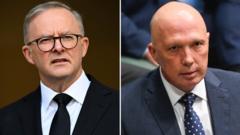In a press conference, Albanese emphasized his government's achievements and strategies to alleviate financial burdens, including proposals for free healthcare, reduced student debt, and tax cuts. He framed the election as not just a choice between parties but a moment of hope versus fear, criticizing Dutton for wanting to revert to previous policies. Dutton countered by arguing that Australians deserve better economic stability and criticized Labor’s decisions that he claims have left many struggling.
The Greens party is also anticipated to play a significant role in the upcoming election, having previously secured a historic number of seats, and they urge voters to keep Labor accountable on various pressing issues. Key voter concerns include the rising cost of housing and groceries, healthcare access, and immigration management, all amidst a backdrop of urgency for climate action.
With compulsory voting in place, either major party must secure at least 76 seats in the House of Representatives to establish majority governance. As political sentiment shifts, both leaders are aware of the significance of this election, especially in light of previous failures and emerging economic challenges.
The Greens party is also anticipated to play a significant role in the upcoming election, having previously secured a historic number of seats, and they urge voters to keep Labor accountable on various pressing issues. Key voter concerns include the rising cost of housing and groceries, healthcare access, and immigration management, all amidst a backdrop of urgency for climate action.
With compulsory voting in place, either major party must secure at least 76 seats in the House of Representatives to establish majority governance. As political sentiment shifts, both leaders are aware of the significance of this election, especially in light of previous failures and emerging economic challenges.




















